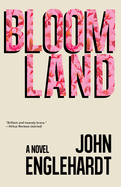
John Englehardt's potent debut novel, Bloomland, offers a nuanced account of the backstory and aftermath of a mass shooting on a fictional Arkansas college campus.
The rotating second-person narration draws readers into the action and creates sympathy for three main characters: Rose, a student who is romantically involved with one of the people injured; Eddie, a professor whose wife dies in the massacre; and Eli, the shooter. Both Rose and Eli lost their mothers at age 11. Englehardt resists clichéd predictors of violence, such as a dysfunctional family (Rose had the more traumatic upbringing than Eli) or cruelty toward animals (Eli quit after one day of debeaking chickens at a poultry factory).
The narrative builds through engrossing flashbacks and vignettes, and moves into the future to examine how the Ozarka University campus and wider community address issues of guilt and vengeance. Gradually, it becomes clear that there is an "I" here: creative writing professor Steven Bressinger. Rose, Eddie, and Eli are all fully realized characters, yet the question of how Dr. Bressinger accesses their memories and emotions is intriguing.
Originally published in 2019 and winner of the VCU Cabell First Novel Award, Bloomland avoids lurid scenes and cheap cause-and-effect language. Englehardt writes gorgeous sentences, even about suburbia ("You start driving down MLK, past the mass grave of dollar stores, under the even clouds converging like one stoic slab of ice"). The perennial aptness of the novel is clear: "you wonder if the scariest thing about all this is not that life can't return to normal, but that it already has." It's a subtle and timely gem. --Rebecca Foster, freelance reviewer, proofreader and blogger at Bookish Beck

